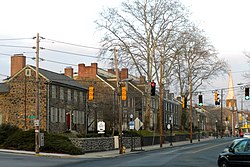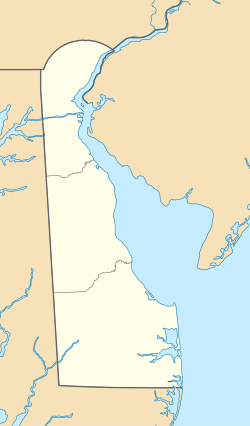
Hockessin is a census-designated place (CDP) in New Castle County, Delaware, United States. The population was 13,478 at the 2020 Census.

Pike Creek is a census-designated place (CDP) in New Castle County, Delaware, United States and is part of the Philadelphia-Camden-Wilmington, PA-NJ-DE-MD Metropolitan statistical area. In 2007, CNN's Money Magazine ranked Pike Creek number 1 on its list of the 100 Best Places to Live in the United States. Pike Creek was the only community in Delaware to appear on the list. The population was 7,808 at the 2020 Census. Local attractions include Middle Run Natural Area, White Clay Creek State Park, Carousel Farm Park and Equestrian Center, Golf and Restaurants. Pike Creek is approximately five miles from downtown Newark, which contains the University of Delaware. Pike Creek is connected to the University of Delaware campus and the Newark downtown area by several bike trails. Pike Creek is approximately 10 miles west of the state's largest city, Wilmington, which is a national financial center.

Brandywine Creek is a tributary of the Christina River in southeastern Pennsylvania and northern Delaware in the United States. The Lower Brandywine is 20.4 miles (32.8 km) long and is a designated Pennsylvania Scenic River with several tributary streams. The East Branch and West Branch of the creek originate within 2 miles (3 km) of each other on the slopes of Welsh Mountain in Honey Brook Township, Pennsylvania, about 20 miles (32 km) northwest of their confluence.
Red Clay Consolidated School District is a public school district in northern New Castle County, Delaware. Founded in 1981, Red Clay serves a portion of the city of Wilmington, as well as its northwestern suburbs.
The John Dickinson School, previously known as John Dickinson High School, is a public high school in the Pike Creek area of Wilmington, Delaware. It is one of five high schools in the Red Clay Consolidated School District and serves parts of Newport, Stanton, Hockessin, Wilmington, North Star, Pike Creek, Pike Creek Valley, Baynard Boulevard, and Brandywine Village.

From 1802 to 1921, Eleutherian Mills was a gunpowder mill site used for the manufacture of explosives founded by Eleuthère Irénée du Pont, which grew into the DuPont company. The name also refers to the house on the hill above the mills, which was the first du Pont family home in America. In 1957 the site became an outdoor museum when the Hagley Museum and Library was founded. The site was declared a National Historic Landmark in 1966.

Wawaset Park is a planned community national historic district located on the western edge of the City of Wilmington, New Castle County, Delaware. The area was formerly the grounds of Schuetzen Park, a horse racing and later auto racing track and fairgrounds. It was purchased in 1917 by the DuPont Company and developed into single-family houses, semi-detached and row houses to meet the housing need for the company's expanding corporate staff. The historic district encompasses 321 contributing buildings and 1 contributing structure.

This is a list of the National Register of Historic Places listings in Clay County, Minnesota. It is intended to be a complete list of the properties and districts on the National Register of Historic Places in Clay County, Minnesota, United States. The locations of National Register properties and districts for which the latitude and longitude coordinates are included below, may be seen in an online map.
Stanton is an unincorporated community in New Castle County, Delaware, United States, near the confluence of the Red Clay and White Clay Creeks. It is located in the southern end of Mill Creek Hundred.

Pike Creek Valley is a census-designated place in New Castle County, Delaware, United States. Its population was 11,217 as of the 2010 census.

The Baynard Boulevard Historic District is a national historic district located at Wilmington, New Castle County, Delaware. It encompasses 77 contributing buildings with examples of Colonial Revival, Tudor Revival, and Queen Anne architecture. The area developed after being laid out in 1893, and is a prime example of a turn-of-the-20th-century American suburb, or "streetcar suburb." The dwellings date between 1895 and 1930. The district is predominantly residential. Also located in the district is the McCabe United Methodist Church, Beth Shalom Synagogue, Hanover Presbyterian Church, and No. 30 School.

Breck's Mill Area, also known as Breck's Mill Area-Henry Clay Village Historic District, is a national historic district located along Brandywine Creek in unincorporated New Castle County, Delaware, near Wilmington. It encompasses 56 contributing buildings, five contributing sites, and three contributing structures. The district encompasses The Mill, The Workers' houses, and The Mill Owner's Home.

Delaware Avenue Historic District is a national historic district located at Wilmington, New Castle County, Delaware. It encompasses 180 contributing buildings and 1 contributing structure developed in the late-19th and early-20th centuries. The district is primarily residential and includes a variety of Victorian-era mansions and large dwellings in a variety of popular architectural styles including Italianate, Queen Anne, Colonial Revival, Classical Revival, and American Four Square The houses are detached or semi-detached and are primarily three stories in height with extensive wings to the rear. The district also includes 20th century apartment complexes. Also located in the district is the St. Stephen's Lutheran Church and the Sailors and Soldiers Monument. The separately listed Howard Pyle Studios are also located in the district.

East Brandywine Historic District is a national historic district located at Wilmington, New Castle County, Delaware. It encompasses 189 contributing buildings located east of the central business district of Wilmington dating from the late-18th to the early-20th century. The buildings reflect a mix of architectural types and styles include industrial buildings, churches, schools, semi-detached houses, rowhouses, apartment houses, restaurants, and stores. Notable non-residential buildings include St. Patrick's Church, Diamond Match Company complex, Security Storage Warehouse, Francis Apartments, Winkler's Restaurant, Delaware Hosiery Manufacturing Company building, F.F. Slocomb Company building. The Howard High School, Kaumagraph Building, and Starr House are located in the district and separately listed.

Cool Spring Park Historic District is a national historic district located at Wilmington, New Castle County, Delaware. It encompasses 316 contributing buildings, 3 contributing structures, and 3 contributing objects in located in and around Cool Spring Park in Wilmington. It developed in the late-19th century as a middle class residential area. They are primarily semi-detached dwellings in a variety of popular styles including Gothic Revival and Queen Anne. Also located in the district is the Cool Spring Pumping Station associated with the Cool Spring Reservoir, Cool Spring Elementary School, and Knights of Pythias Hall.

Suffolk Historic District is a national historic district located at Suffolk, Virginia. The district encompasses 514 contributing buildings, 3 contributing structures, and 3 contributing objects in Suffolk. The district includes a variety of residential, commercial, governmental, and institutional buildings. They are in a variety of vernacular and popular 19th and 20th century architectural styles including Greek Revival, Queen Anne, and Bungalow. Notable buildings include the Allmond Building (1914), Macedonia A.M.E. Church, National Bank of Suffolk (1914-1920), the Old Post Office, old Nansemond County Courthouse, John Granberry house, Richard Seth Eley House (1878), Jones Building, Suffolk Towers, Virginia Apartments (1918-1920), Causey-Kendrick house (1882), Masonic Hall (1911), Suffolk High School (1922), Jefferson High School (1911), old Methodist Church (1861), St. Paul's Episcopal Church (1895), Suffolk Christian Church (1893), and Congregation of Agudath Achin. Located in the district are the separately listed Phoenix Bank of Nansemond, Professional Building, and Riddick House.

The Alphabet Historic District, is a historic district in the Northwest District of Portland, Oregon which was listed on the National Register of Historic Places in 2000. It is 156.9 acres (63.5 ha) in area and includes 478 contributing buildings. It is roughly bounded by NW Lovejoy St., NW Marshall St., NW 17th Ave., W. Burnside St., and NW 24th Ave.

Woodside Cotton Mill Village Historic District is a national historic district located in Greenville County, South Carolina. The district encompasses 278 contributing buildings and 2 contributing sites in an early 20th century urban South Carolina textile mill village. Centered on a mill founded by John T. Woodside in 1902, the district is located just west of the city limits of Greenville and is largely intact despite modernizations made by a succession of mill and home owners. The mill itself is a rectangular, brick, four-story building designed by J.E. Sirrine and built between 1902 and 1912. Eventually the mill became the largest cotton mill under one roof in the United States and one of the largest in the world.

The Whitehouse–Mechanicsville Historic District is a historic district located along old New Jersey Route 28, Mill, Lamington and School Roads in Whitehouse and Mechanicsville, unincorporated communities in Readington Township, Hunterdon County, New Jersey. It was added to the National Register of Historic Places on March 17, 2015 for its significance in architecture and community development. The district includes 140 contributing buildings.




















